初一英语上Unit6-Unit10语法复习 (2)
- 格式:doc
- 大小:80.00 KB
- 文档页数:11

人教版七年级上册英语Unit 6 知识点总结1.名词分类(1)可数名词:是可以计数的名词;可数名词前可以用 a, an 限定,表一个…...也可以用 one, two, three…限定;可数名词有复数形式。
(2)不可数名词:指不能计数的名词;不可数名词前不可以用 a, an 限定,表一个…...也不可以用 one, two, three…限定;不可数名词没有复数形式。
(3)既可数又不可数名词:定义:在某些情况下能计数,在某些情况下不能计数的名词。
既可数又不可数的名词有:chicken,fish,salad,ice-cream,orange……eg:a chicken 一只鸡chicken 鸡肉a salad 一碟沙拉salad 沙拉(指成份)2. . How about burgers, vegetable salad…?How about…?相当于 What about …? 意为“……怎么样?”是一个用来征询别人的意见、向别人提建议的交际用语。
about是介词,后跟名词、代词或动词-ing形式。
eg:How about nine o’clock? 9点钟怎么样?What about having hamburgers? 吃汉堡包怎么样?3.Let’s have strawberries and apples then.(1)Let’s have …让我们吃/喝……吧——let sb. do sth.让某人做某事;let sb. not do sth.让某人不做某事(2)have是多义词,归纳如下:1) 有,拥有; I have a new watch.2) 吃,喝; Let’s have some milk and some bread.3) 构成固定短语: have a look 看一看4. Let’s think about the food.(1)think about 思考,思索(一般是短时间的较仔细的考虑)e.g. :What do you think about that?你认为怎么样?I’ll have to think about it. 我得想一想。
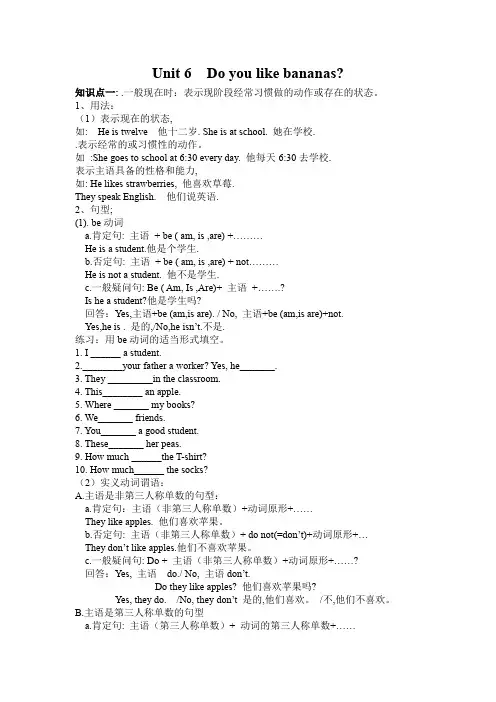
Unit 6 Do you like bananas?知识点一: .一般现在时:表示现阶段经常习惯做的动作或存在的状态。
1、用法:(1)表示现在的状态,如: He is twelve 他十二岁. She is at school. 她在学校..表示经常的或习惯性的动作。
如:She goes to school at 6:30 every day. 他每天6:30去学校.表示主语具备的性格和能力,如: He likes strawberries, 他喜欢草莓.They speak English. 他们说英语.2、句型;(1). be动词a.肯定句: 主语+ be ( am, is ,are) +………He is a student.他是个学生.b.否定句: 主语+ be ( am, is ,are) + not………He is not a student. 他不是学生.c.一般疑问句: Be ( Am, Is ,Are)+ 主语+…….?Is he a student?他是学生吗?回答:Yes,主语+be (am,is are). / No, 主语+be (am,is are)+not.Yes,he is . 是的,/No,he isn’t.不是.练习:用be动词的适当形式填空。
1. I ______ a student.2.________your father a worker? Yes, he_______.3. They _________in the classroom.4. This________ an apple.5. Where _______ my books?6. We_______ friends.7. You_______ a good student.8. These_______ her peas.9. How much ______the T-shirt?10. How much______ the socks?(2)实义动词谓语:A.主语是非第三人称单数的句型:a.肯定句:主语(非第三人称单数)+动词原形+……They like apples. 他们喜欢苹果。
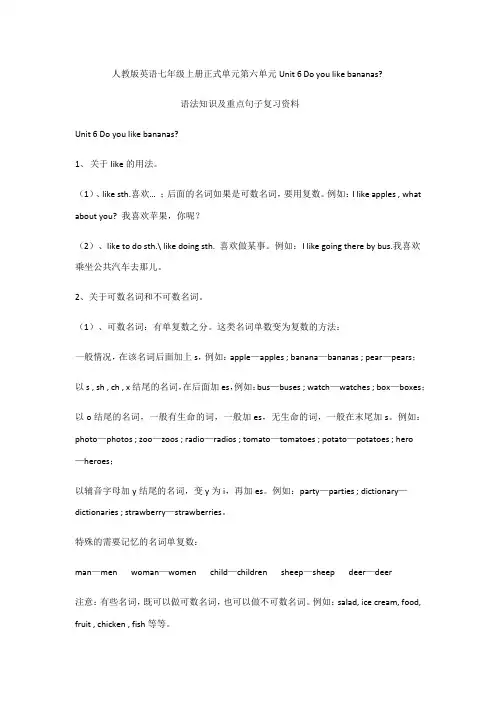
人教版英语七年级上册正式单元第六单元Unit 6 Do you like bananas?语法知识及重点句子复习资料Unit 6 Do you like bananas?1、关于like的用法。
(1)、like sth.喜欢…;后面的名词如果是可数名词,要用复数。
例如:I like apples , what about you? 我喜欢苹果,你呢?(2)、like to do sth.\ like doing sth. 喜欢做某事。
例如:I like going there by bus.我喜欢乘坐公共汽车去那儿。
2、关于可数名词和不可数名词。
(1)、可数名词:有单复数之分。
这类名词单数变为复数的方法:一般情况,在该名词后面加上s,例如:apple—apples ; banana—bananas ; pear—pears;以s , sh , ch , x结尾的名词,在后面加es,例如:bus—buses ; watch—watches ; box—boxes;以o结尾的名词,一般有生命的词,一般加es,无生命的词,一般在末尾加s。
例如:photo—photos ; zoo—zoos ; radio—radios ; tomato—tomatoes ; potato—potatoes ; hero —heroes;以辅音字母加y结尾的名词,变y为i,再加es。
例如:party—parties ; dictionary—dictionaries ; strawberry—strawberries。
特殊的需要记忆的名词单复数:man—men woman—women child—children sheep—sheep deer—deer注意:有些名词,既可以做可数名词,也可以做不可数名词。
例如:salad, ice cream, food, fruit , chicken , fish等等。
3、关于good与wellgood好的、令人满意的,形容词,修饰名词。
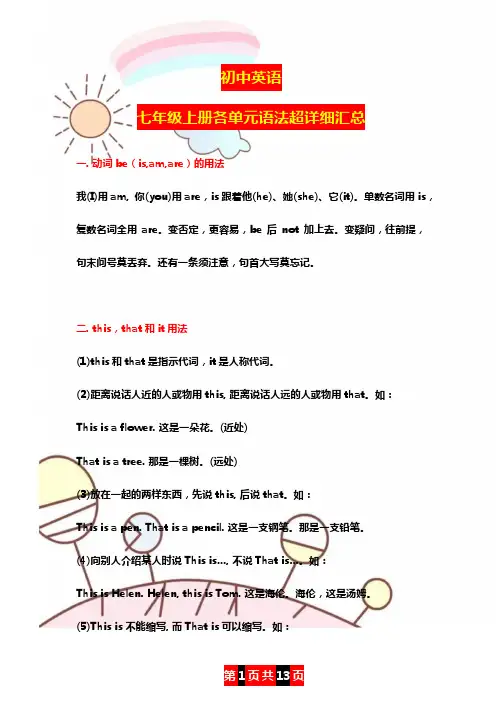
初中英语七年级上册各单元语法超详细汇总一. 动词be(is,am,are)的用法我(I)用am, 你(you)用are,is跟着他(he)、她(she)、它(it)。
单数名词用is,复数名词全用are。
变否定,更容易,be后not加上去。
变疑问,往前提,句末问号莫丢弃。
还有一条须注意,句首大写莫忘记。
二. this,that和it用法(1)this和that是指示代词,it是人称代词。
(2)距离说话人近的人或物用this, 距离说话人远的人或物用that。
如:This is a flower. 这是一朵花。
(近处)That is a tree. 那是一棵树。
(远处)(3)放在一起的两样东西,先说this, 后说that。
如:This is a pen. That is a pencil. 这是一支钢笔。
那是一支铅笔。
(4)向别人介绍某人时说This is…, 不说That is…。
如:This is Helen. Helen, this is Tom. 这是海伦。
海伦,这是汤姆。
(5)This is 不能缩写, 而That is可以缩写。
如:This is a bike. That’s a car. 这是一辆自行车。
那是一辆轿车。
(6)打电话时,介绍自己用this, 询问对方用that。
如:—Hello! Is that Miss Green? 喂,是格林小姐吗?—Yes, this is. Who’s that? 是的,我是,你是谁?注意:虽然汉语中使用“我”和“你”,但英语中打电话时绝不可以说:I am…, Are you…?/Who are you?(7)在回答this或that作主语的疑问句时, 要用it代替this或that。
如:①—Is this a notebook? 这是笔记本吗?—Yes, it is. 是的,它是。
②—What’s that? 那是什么?—It’s a kite. 是只风筝。
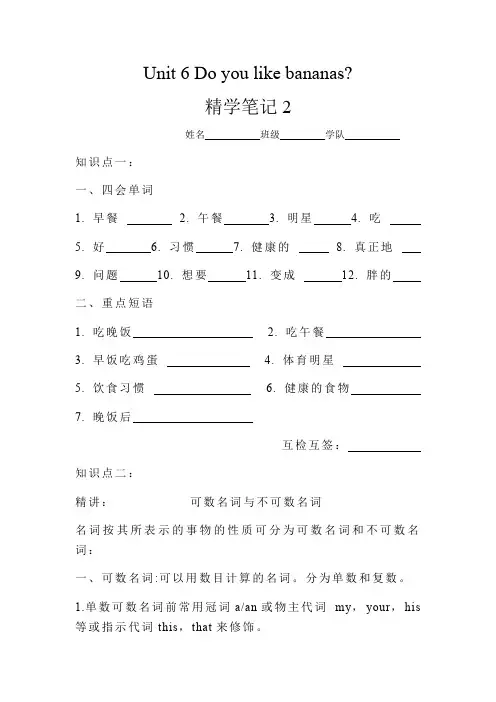
Unit 6 Do you like bananas?精学笔记2姓名___________班级_________学队___________知识点一:一、四会单词1. 早餐2. 午餐3. 明星4. 吃5. 好6. 习惯7. 健康的8. 真正地9. 问题10. 想要11. 变成12. 胖的二、重点短语1. 吃晚饭2. 吃午餐3. 早饭吃鸡蛋4. 体育明星5. 饮食习惯6. 健康的食物7. 晚饭后互检互签:知识点二:精讲:可数名词与不可数名词名词按其所表示的事物的性质可分为可数名词和不可数名词:一、可数名词:可以用数目计算的名词。
分为单数和复数。
1.单数可数名词前常用冠词a/an或物主代词my,your,his 等或指示代词this,that来修饰。
2.若表示一类事物可用a/an加名词单数表示,也可用复数名词表示。
二、可数名词单数变复数的规则:1.一般情况下,在名词词尾加-s;2.在以x,s,sh,ch结尾的名词后加-es;3.以辅音字母加y结尾的名词,先将y改为i,再加-es;4.以fe或f结尾的名词,先改f或fe为v,再加-es;5.以o结尾的无生命的名词如photo,zoo,radio等加-s;有生命的名词如tomato,potato等加es;6.另有一些不规则变形。
如man-men; woman-women; child-children等。
三、不可数名词:是指无法用数目计算,无一完整结构及无生命的一类名词。
它们的用法如下:1.无复数形式。
2.不能用不定冠词a/an或指示代词this,that,these,those 和数词one,two,three等来修饰,但可用定冠词the或some 或lots of(许多)来修饰。
3.作主语时,谓语动词要用单数形式。
4.用代词指代不可数名词时,用单数it,不用复数they或them。
精练:一、用所给单词的适当形式填空。
1.I like (banana).2.Do you like those (thing)?3.He eats (chicken)for lunch.4.Does your sister like (salad)?5.My sister eats two (tomato)every day.6.There are two (man)in the room.7.Some new (watch)are on the table.8.He likes all (vegetable).二、把下列句子单数复数形式互换。
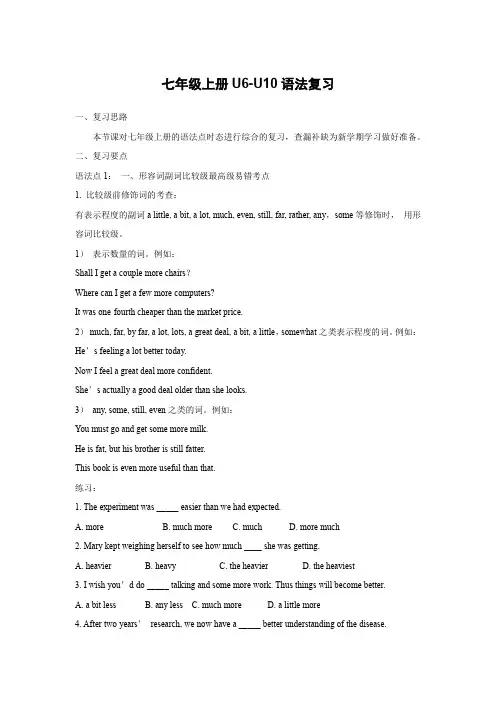
七年级上册U6-U10语法复习一、复习思路本节课对七年级上册的语法点时态进行综合的复习,查漏补缺为新学期学习做好准备。
二、复习要点语法点1:一、形容词副词比较级最高级易错考点1. 比较级前修饰词的考查:有表示程度的副词a little, a bit, a lot, much, even, still, far, rather, any,some等修饰时,用形容词比较级。
1)表示数量的词。
例如:Shall I get a couple more chairs?Where can I get a few more computers?It was one-fourth cheaper than the market price.2)much, far, by far, a lot, lots, a great deal, a bit, a little,somewhat之类表示程度的词。
例如:He’s feeling a lot better today.Now I feel a great deal more confident.She’s actually a good deal older than she looks.3)any, some, still, even之类的词。
例如:You must go and get some more milk.He is fat, but his brother is still fatter.This book is even more useful than that.练习:1. The experiment was _____ easier than we had expected.A. moreB. much moreC. muchD. more much2. Mary kept weighing herself to see how much ____ she was getting.A. heavierB. heavyC. the heavierD. the heaviest3. I wish you’d do _____ talking and some more work. Thus things will become better.A. a bit lessB. any lessC. much moreD. a little more4. After two years’research, we now have a _____ better understanding of the disease.A. veryB. farC. fairlyD. quiteKey: 1-4 CAAB2.表示两者之间进行选择“哪一个更……”时,用句型“Which/Who is +形容词比较级,A or B?”表示。
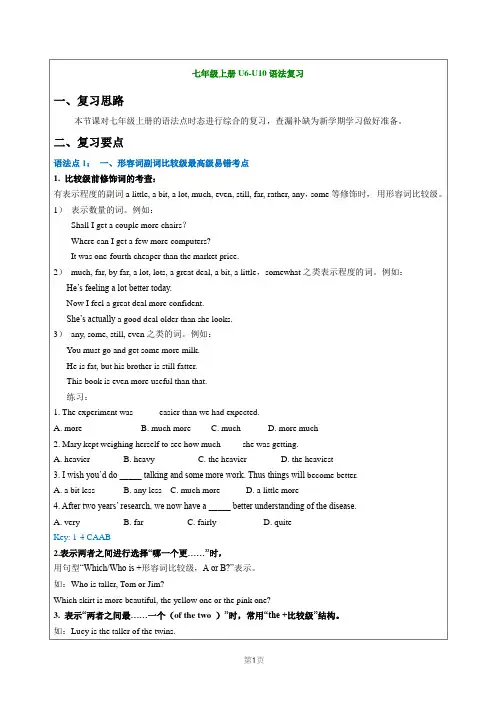
I prefer the cheaper one of the two books.Of the two brothers, he is the cleverer.课堂练习之形容词副词比较级最高级用所给词的正确形式填空:1. Of the two girls, I find Lucy the _______ (clever).2. Gold(黄金) is ______ (little) useful than iron(铁).3. My sister is two years _______ (old ) than I.4. John’s paren ts have four daughters, and she is the _____ (young) child.5. The short one is by far _______ (expensive) of the five.6. Dick sings _____ (well), she sings ______(well) than John, but Mary sings______(well) in her class.7. She will be much ______ (happy) in her mew house.1. cleverer2.less3.older4.youngest5.the most expensive6.well, better, best7.happier单项选择1. The population of the world in 20th century became very much _________ than that in 19th.A. biggerB. largerC. greaterD. more2. Miss Li is one of _______ in our school.A. a popular teacherB. more popular teacherC. most popular teacherD. the most popular teachers3. The magazines are ________ easy that the children can read them well.A. suchB. soC. tooD. very4.—— Would you like ________ more tea?——Thank you. I’ve had ________.A. any, muchB. some, enoughC. some, muchD. any, enough5. I think basketball is _______. I like to watch it.A. boringB. boredC. excitingD. excited6. This dinner looks _______ to me, and I like it.A. terribleB. goodC. badlyD. nicely7. The math problem is so hard that ________ students can work it out.A. a fewB. a littleC. manyD. few8.——What’s the weather like tomor row?—— The radio says it is going to be even ______.A. badB. worstC. badlyD. worse9. Though she talks ______, she has made ________ friends here.A. a little, a fewB. little, few2) Don’t look out of the window.Sorry, I won’t.课堂练习之祈使句一.单项选择1. The TV is too loud. Please ________.A. turn it downB. to turn it downC. turn down itD. to turn down it2. _______ late again, Bill!A. Don't to beB. Don't beC. Not beD. Be not3. _______ cross the road until the traffic lights turn green.A. NotB. Won'tC. Doesn'tD. Don't4. Please help me carry it, ______?A. will IB. will youC. shall ID. shall we5. Don't make so much noise, ______?A. will youB. won't youC. shall weD. do you6. Kate, _______ your homework here tomorrow.A. bringB. bringsC. to bringD. bringing7. ________ me the truth, or I'll be angry.A. TellingB. To tellC. ToldD. Tell8. ______ go for the book alone, Mrs Zhang.A Let’sB Let meC LetusD Allow10. John, read the text for us,________?A does heB will heC do youD will you9.Let’s do it at once, ________ ?A shall weB will youC do weD do you10. Let us do it at once, ________ ?A shall weB will youC do weD do you11. _____ this kind of peach, and you will like it.A. To tryB. TryingC. TryD. Tried12. _____ the radio, please. The baby is sleeping now. 、A. Not turn onB. Don’t turn onC. Not turn downD. Don’t turn down13. —______ late for school again, Tim! —Sorry, I promise that I ______.A. Don’t;won’tB. Don’t be; won’tC. Don’t be; don’tD. Don’t; will14. Boys and girls, ______ up your hands if you want to go for a picnic this weekend.A. puttingB. to putC. putD. puts二. 句型转换1). If you don't listen to me, I'll go. (改为同义句)_____ _____ me, or I'll go.2). let’s watch the sports games. (改为反意疑问句)Let's watch the sports games, _____ _____?3).The teachers often tell the students not to be careless.(改为祈使句)_____ _____careless, please.4). Please sit next to Nancy. (改为否定句)_____ _____ next to Nancy.5). Don't forget to turn off the lights, please.(改为反意疑问句)Don't forget to turn off the lights, _____ _____?6). If you move, you'll die. (改为同义句)_____ _____, or you'll die.7). Come to my house tomorrow. (改为反意疑问句)Come to my house tomorrow, _____ _____?Keys: 1) listen to, 2) shall we 3) Don’t be 4) Don’t sit 5) will you 6) Don’t move 7) will you 语法点三:if 条件句和unless 条件句1)If条件句:在表示将来可能发生的事情的if条件句中,主句用一般将来时,而if从句用一般现在时表示将来的时间,即主将从现Eg.If I like the house, I will buy it. 如果我喜欢这房子,我就会把它买下I will tell her if I see her. 如果我见到她,我就会告诉她。
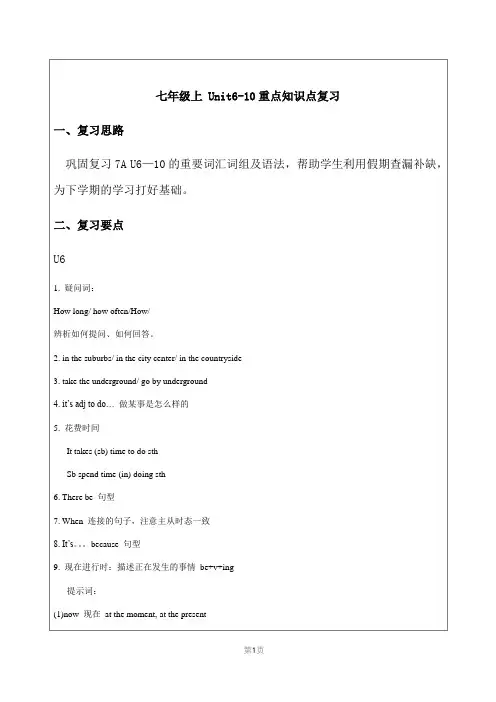
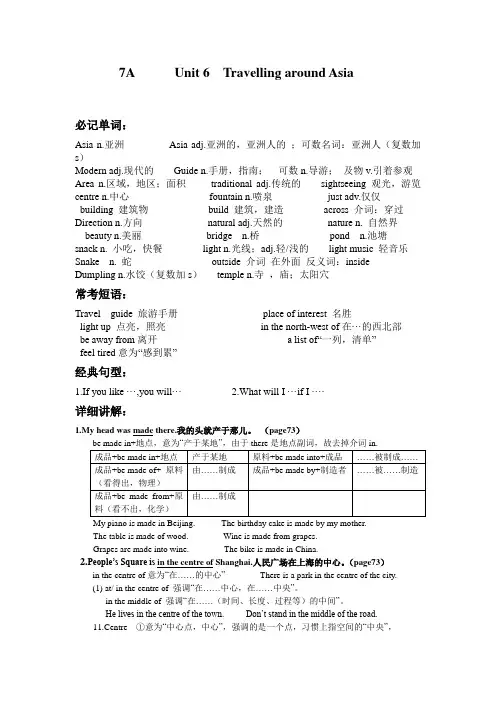
7A Unit 6 Travelling around Asia必记单词:Asia n.亚洲Asia adj.亚洲的,亚洲人的;可数名词:亚洲人(复数加s)Modern adj.现代的Guide n.手册,指南;可数n.导游;及物v.引着参观Area n.区域,地区;面积traditional adj.传统的sightseeing 观光,游览centre n.中心fountain n.喷泉just adv.仅仅building 建筑物build 建筑,建造across 介词:穿过Direction n.方向natural adj.天然的nature n. 自然界beauty n.美丽bridge n.桥pond n.池塘snack n. 小吃,快餐light n.光线;adj.轻/浅的light music 轻音乐Snake n. 蛇outside 介词在外面反义词:inside Dumpling n.水饺(复数加s)temple n.寺,庙;太阳穴常考短语:Travel guide 旅游手册place of interest 名胜light up 点亮,照亮in the north-west of在···的西北部be away from离开 a list of“一列,清单”feel tired意为“感到累”经典句型:1.If you like ···,you will···2.What will I ···if I ····详细讲解:1.My head was made there.我的头就产于那儿。
(page73)My piano is made in Beijing. The birthday cake is made by my mother.The table is made of wood. Wine is made from grapes.Grapes are made into wine. The bike is made in China.2.People’s Square is in the centre of Shanghai.人民广场在上海的中心。
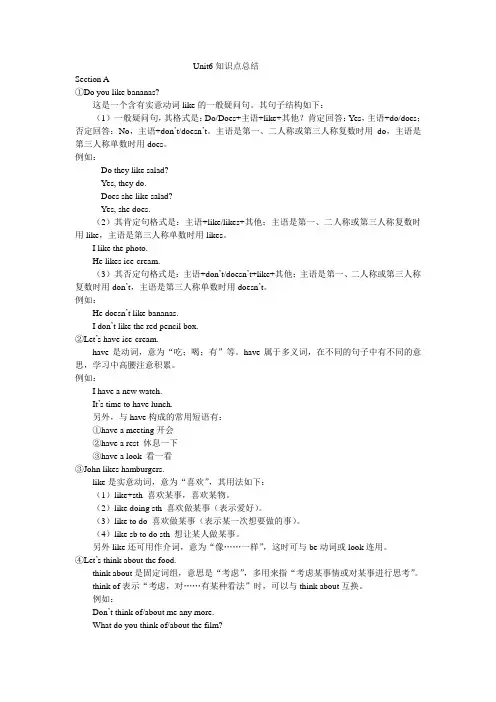
Unit6知识点总结Section A①Do you like bananas?这是一个含有实意动词like的一般疑问句。
其句子结构如下:(1)一般疑问句,其格式是:Do/Does+主语+like+其他?肯定回答:Yes,主语+do/does;否定回答:No,主语+don’t/doesn’t。
主语是第一、二人称或第三人称复数时用do,主语是第三人称单数时用does。
例如:---Do they like salad?---Yes, they do.---Does she like salad?---Yes, she does.(2)其肯定句格式是:主语+like/likes+其他;主语是第一、二人称或第三人称复数时用like,主语是第三人称单数时用likes。
I like the photo.He likes ice-cream.(3)其否定句格式是:主语+don’t/doesn’t+like+其他;主语是第一、二人称或第三人称复数时用don’t,主语是第三人称单数时用doesn’t。
例如:He doesn’t like bananas.I don’t like the red pencil box.②Let’s have ice-cream.have是动词,意为“吃;喝;有”等。
have属于多义词,在不同的句子中有不同的意思,学习中高腰注意积累。
例如:I have a new watch.It’s time to have lunch.另外,与have构成的常用短语有:①have a meeting开会②have a rest 休息一下③have a look 看一看③John likes hamburgers.like是实意动词,意为“喜欢”,其用法如下:(1)like+sth 喜欢某事,喜欢某物。
(2)like doing sth 喜欢做某事(表示爱好)。
(3)like to do 喜欢做某事(表示某一次想要做的事)。
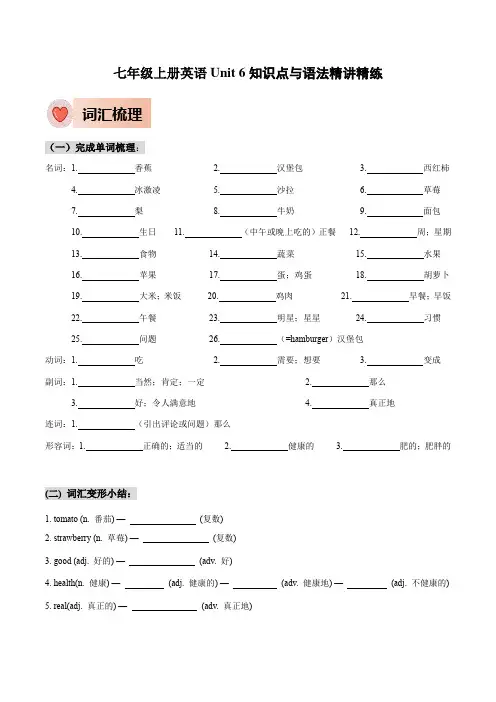
七年级上册英语Unit 6知识点与语法精讲精练词汇梳理(一)完成单词梳理:名词:1. 香蕉 2. 汉堡包 3. 西红柿4. 冰激凌5. 沙拉6. 草莓7. 梨8. 牛奶9. 面包10. 生日11. (中午或晚上吃的)正餐12. 周;星期13. 食物14. 蔬菜15. 水果16. 苹果17. 蛋;鸡蛋18. 胡萝卜19. 大米;米饭20. 鸡肉21. 早餐;早饭22. 午餐23. 明星;星星24. 习惯25. 问题26. (=hamburger)汉堡包动词:1. 吃 2. 需要;想要 3. 变成副词:1. 当然;肯定;一定 2. 那么3. 好;令人满意地4. 真正地连词:1. (引出评论或问题)那么形容词:1. 正确的;适当的 2. 健康的 3. 肥的;肥胖的(二) 词汇变形小结:1. tomato (n. 番茄) — (复数)2. strawberry (n. 草莓) — (复数)3. good (adj. 好的) — (adv. 好)4. health(n. 健康) — (adj. 健康的) — (adv. 健康地) — (adj. 不健康的)5. real(adj. 真正的) — (adv. 真正地)【练一练】用所给词的适当形式填空1.For breakfast, I like bread and _________ (banana).2.Look! Some vegetables _________(be) in the basket.3.He plays basketball _________ (good).4.Jenny eats lots of _________ (health)food.5.John likes (strawberry) very much.6.Sandra Clark (eat) eggs and apples every day.7.I have rice, eggs and (tomato) for lunch.8.The trip for two (week) is very fun.9.My friend Bob (like) eating fruit after dinner.10.Here are some (egg).(三) 短语攻关:思考;思索生日晚餐下周体育明星吃得健康健康的食物询问某人某事晚餐后饮食习惯蔬菜沙拉知识点梳理1. Do you like bananas? 你喜欢香蕉吗?【用法详解】“Do/Does+sb+like+其他?”意为“某人喜欢……吗?”,该句型为一般疑问句,用于询问某人的喜好。
第一部分七年级上册英语语法一,口诀1. 英文字母书写规则口诀:笔顺正确,占格准确,右倾斜5度,2.大写字母用法口诀:句子开头首字母,文章标题除虚词;(介词,连词)专有名词要记住,节日,月份,星期几;报纸,杂志和书籍,职业,头衔和称谓;大写I,,缩略词3.动词()的用法口诀:我(I)用, 你()用,跟着他(),她(),它()。
单数名词用,复数名词全用。
变否定,更容易,后加上去。
变疑问,往前提,句末问号莫丢弃。
还有一条须注意,句首大写要牢记。
4. a ,的用法口诀:(不看字母看发音)名词是秃子,需要带帽子;可数名词单,需要用a或;辅音前用a,元音前用:5. 定冠词的用法口诀:特指双熟悉,上文已提及;世上独无二,序数最高级;某些专有词,习语及乐器。
6. 零冠词用法的口诀:代词限定名词前,专有名词不可数季节星期月份前,学科球类和三餐颜色国名和语言,称呼习语和头衔7.单数句变复数句的变化口诀:单数句子变复数,变化规则要记住代词名词要变化,谓语动词不能落,变为,I变别落下,要咋办,,代替它,,要变啥,全部变就行了名前冠词去掉它,名复要把加注意:复数变单数,口诀反着用8.基数词变序数词的口诀:基变序, 有规律, 词尾加上.1 2 3 特殊记, 词尾字母t,d,d。
8 少t, 9 去e, f 来把v e 替。
整十y变为, 后跟莫迟疑。
若想表示几十几,只变个位就可以。
基数词的书写:①1-12 无规律②13-19个位后加(13,15,18特殊记,,)③20-90 表示“几十”,以结尾(,,,,,,,)④表示“几百” 个位数⑤表示“几百几”百后加就可以⑥表示千同百(一千)二.,和用法(1)和是指示代词,是人称代词。
(2)距离说话人近的人或物用, 距离说话人远的人或物用。
如:a . 这是一朵花。
(近处)a . 那是一棵树。
(远处)(3)放在一起的两样东西,先说, 后说。
如:a . a . 这是一支钢笔。
那是一支铅笔。
(4)向别人介绍某人时说…, 不说…。
七年级上册unit6 知识点总结七年级上册unit6讲述了关于家人、朋友和爱情的话题,让同学们更深入地了解这些关系。
这个单元还包括了一些常用的动词时态、词汇和语法结构,让同学们提高英语运用能力。
本文将对七年级上册unit6的重点知识进行总结。
一、动词的时态unit6中涉及到了一些常用的动词时态,包括:一般现在时、现在进行时和一般过去时。
1. 一般现在时:表示现在发生的动作或状态。
例如:I eat breakfast every day.(我每天早上都吃早餐。
)2. 现在进行时:表示当前正在发生的动作。
例如:He is playing basketball now.(他现在正在打篮球。
)3. 一般过去时:表示过去发生的动作。
例如:She went to the beach last weekend.(上个周末她去了海滩。
)二、常用词汇和短语1. family(家庭):指父母和孩子、兄弟姐妹等亲属关系。
2. friend(朋友):指彼此之间有交情或感情的人。
3. love(爱情):指深厚的感情关系,可以是亲情、友情和爱情等。
4. have fun(玩得开心):用于描述某人正在享受某种乐趣或玩得很高兴。
5. get together(聚会):用于描述好友、家人等在一起做某种活动。
三、重要语法结构1. 代词:用于代替名词,以使句子更加简洁。
例如:My mother is a teacher. She loves her job.(我妈妈是一名教师。
她热爱她的工作。
)2. 比较级和最高级形式:用于比较两个或多个事物的大小、重要性等。
例如:My cat is bigger than hers.(我的猫比她的大。
)3. 非谓语动词:包括动词不定式、动词-ing形式和动词分词等。
非谓语动词可以作为主语、宾语等。
例如:Swimming is good for health.(游泳有益于健康。
)以上就是七年级上册unit6的重点知识总结,包括常用的动词时态、词汇和语法结构。
初一英语上册各单元知识点总结Unit 1 My name’s Gina【语法看点】语法探究一:常见的打招呼的问候语人际交往中,最常用的语言是打招呼的问候用语。
在不同的国家里,打招呼和问候的方式是不同的。
中国人喜欢用“吃了吗?”“你干什么去?”作为打招呼的开场白,而在欧美国家的人们是怎样打招呼或问候呢?1.熟人打招呼:—Hello! /Hi!—Hello! /Hi!2.不同时段的问候:—Good morning/afternoon/evening/night! (Morning!/Afternoon!/Evening!)—Good morning!/afternoon!/evening!3.熟人间关心的问好:—How are you?—Fine. thank you. And you?(I'm fine,thank you./I'm OK./Not bad.)4.晚上睡觉前的告别语:—Good night!晚安!—Good night!晚安!语法探究二:打电话用语我们经常打电话,但你知道怎样用英语给别人打电话吗?1.This is...(speaking).我是……2.Who is that? 你是准?或Is that...(speaking)? 你是……吗?3.May I speak to...,please? 我可以跟…说话吗?4.He's in (out).他在家(不在家)。
5.Can I take a message for you? 我可以为你捎信吗?6.Can I leave a message? 我可以留个信儿吗?7.Hold on,please.稍等。
Unit 2 This is my sister【语法看点】语法探究一:介绍和自我介绍“介绍和自我介绍”是新课程标准中的话题之一。
学会向外人介绍自己的家人是中学生日常用语常用的语言,也是中考中交际英语常考的内容。
七年级英语上册Unit 6语法和写作知识讲解一、语法(一)一般现在时:【用法详解】1.用法:(1)表示经常性或习惯性的动作或现在存在的状态(2)表示人的性格、能力、特征或爱好等。
(3)表示客观真理或普遍事实。
2.句式:(1)肯定句:主语 + 动词原形 + 其它Eg: I often go to school at 7:00. 我经常七点去上学。
(2)否定句:主语 + don’t + 动词原形 + 其它Eg: They don’t sing every morning. 它们每天早上不唱歌。
(3)一般疑问句:Do + 主语 + 动词原形 + 其它肯定回答:Yes, 主语 + do. 否定回答:No, 主语 + don’t.Eg: Do they play football after school? Yes, they do./ No, they don’t.他们放学后踢足球吗?(4)特殊疑问句:疑问词 + do + 主语 + 动词原形 + 其它 ?Eg: What do you want to do? 你想做什么?3.在一般现在时的句子中,行为动词前不能有be动词4.do除了作助动词,还可用作行为动词,译为“做”,变否定句时,不能再实义动词do后加not,要在前加don’t。
Eg: I don’t do homework on Sundays. 我周日不做作业。
当句子的主语是第三人称单数时,谓语动词也要使用第三人称单数形式,即“主语 + 动词三单 + 其它”;回答以does开头的问句时,答语仍要用does或其否定形式doesn’t,不可使用其它助动词或行为动词。
5.动词三单形式变化规则(1)一般情况下加– s;Eg: work -- works; like -- likes(2)以s, x, ch, sh, 结尾,加-es ;Eg: finish -- finishes; teach -- teaches(3)以辅音字母 + y 结尾,变y为i加es;Eg: carry -- carries; fly -- flies(4)以O结尾,且O前为辅音,加es ;Eg: go -- goes; do -- doesEg: Tom likes playing basketball.汤姆喜欢打篮球。
七年级上英语6单元知识点七年级上英语6单元主要教授以下内容:一、一般过去时一般过去时表示发生在过去的动作或状态,其结构为:主语 + 动词的过去式 + 其他。
例如:I played basketball yesterday.(我昨天打篮球了。
)He went to the park with his friends last weekend.(上周末他和朋友去了公园。
)二、时间状语从句时间状语从句表示时间的先后关系,其引导词为:when、while、as、before、after、since、until、till等。
例如:I was doing my homework when my sister came in.(我正在做作业,这时我的妹妹进来了。
)He didn't go to bed until he finished his work.(他一直工作到完成,才去睡觉。
)三、there be句型there be句型表示某处有某物或某人的情况,其结构为:there + is/are + 名词。
例如:There is a book on the table.(桌子上有一本书。
)There are some apples in the basket.(篮子里有一些苹果。
)四、交通工具本单元还涉及到交通工具的相关知识,包括火车、汽车、地铁、出租车等。
例如:I usually take the subway to school.(我通常坐地铁去学校。
)My family often travels by car.(我家经常乘车出游。
)以上就是七年级上英语6单元的主要知识点。
希望同学们在学习中能够掌握这些知识,并且能够在实践中运用。
人教版英语七年级上册Unit6语法知识点梳理重点语法1.可数名词:banana-bananashamburger-hamburgerstomato-tomatoesstrawberry-strawberriespear-pearsvegetable-vegetablesapple-applesegg-eggscarrot-carrots不可数名词:ice-creamsaladmilkbread foodricechicken(鸡肉)名词复数变化规则:(1)一般在词尾加-s。
book→booksbag→bags(2)以s,x,ch,sh结尾的名词,一般在词尾加-es。
class→classes(3)以“元音字母+y”结尾的名词,在词尾加-s.boy→boys(4)以“辅音字母+y”结尾的名词,先将y变为i,再加-es。
family→families(5)以f或fe结尾的名词,变f或fe为v,再加-es.knife→knives(6)一些以字母o结尾的名词变复数时有的加-es有的加-s hero→heroes(英雄)potato→potatoes(土豆)tomato→tomatoes(西红柿)photo→photos(照片)(7)一些名词变化不规则,如:man→menchild→children ②不可数名词:不可数名词没有复数形式,不能直接用数词来表示数量,如果要表示数量,必须借助其他词来完成。
用“计量单位词+of短语”表示,其数量也应该通过of前面的名词来体现出来。
aglassofwater一杯水twoglassesofwater两杯水acupoftea 一杯茶twocupsoftea两杯茶apieceofbread一片面包twopiecesofbread两片面包还有一类词既可作可数名词又可作不可数名词,如:orange(橘子汁,不可数)→oranges(橘子,可数) chicken(鸡肉,不可数)→chickens(小鸡,可数)。
课堂练习之形容词副词比较级最高级用所给词的正确形式填空:1. Of the two girls, I find Lucy the _______ (clever).2. Gold(黄金) is ______ (little) useful than iron(铁).3. My sister is two years _______ (old ) than I.4. John’s parents have four daughters, and she is the _____ (young) child.5. The short one is by far _______ (expensive) of the five.6. Dick sings _____ (well), she sings ______(well) than John, but Mary sings______(well) in her class.7. She will be much ______ (happy) in her mew house.1. cleverer2.less3.older4.youngest5.the most expensive6.well, better, best7.happier单项选择1. The population of the world in 20th century became very much _________ than that in 19th.A. biggerB. largerC. greaterD. more2. Miss Li is one of _______ in our school.A. a popular teacherB. more popular teacherC. most popular teacherD. the most popular teachers3. The magazines are ________ easy that the children can read them well.A. suchB. soC. tooD. very4.—— Would you like ________ more tea?——Thank you. I’ve had ________.A. any, muchB. some, enoughC. some, muchD. any, enough5. I think basketball is _______. I like to watch it.A. boringB. boredC. excitingD. excited6. This dinner looks _______ to me, and I like it.A. terribleB. goodC. badlyD. nicely7. The math problem is so hard that ________ students can work it out.A. a fewB. a littleC. manyD. few8.——What’s the weather like tomorrow?—— The radio says it is going to be even ______.A. badB. worstC. badlyD. worse9. Though she talks ______, she has made ________ friends here.A. a little, a fewB. little, fewC. little, a fewD. few, a few10. He never does his work _______ Mary.课堂练习之祈使句一.单项选择1. The TV is too loud. Please ________.A. turn it downB. to turn it downC. turn down itD. to turn down it2. _______ late again, Bill!A. Don't to beB. Don't beC. Not beD. Be not3. _______ cross the road until the traffic lights turn green.A. NotB. Won'tC. Doesn'tD. Don't4. Please help me carry it, ______?A. will IB. will youC. shall ID. shall we5. Don't make so much noise, ______?A. will youB. won't youC. shall weD. do you6. Kate, _______ your homework here tomorrow.A. bringB. bringsC. to bringD. bringing7. ________ me the truth, or I'll be angry.A. TellingB. To tellC. ToldD. Tell8. ______ go for the book alone, Mrs Zhang.A Let’sB Let meC LetusD Allow10. John, read the text for us,________?A does heB will heC do youD will you9.Let’s do it at once, ________ ?A shall weB will youC do weD do you10. Let us do it at once, ________ ?A shall weB will youC do weD do you11. _____ this kind of peach, and you will like it.A. To tryB. TryingC. TryD. Tried12. _____ the radio, please. The baby is sleeping now. 、A. Not turn onB. Don’t turn onC. Not turn downD. Don’t turn down13. —______ late for school again, Tim! —Sorry, I promise that I ______.A. Don’t;won’tB. Don’t be; won’tC. Don’t be; don’tD. Don’t; will14. Boys and girls, ______ up your hands if you want to go for a picnic this weekend.A. puttingB. to putC. putD. puts二. 句型转换1). If you don't listen to me, I'll go. (改为同义句)_____ _____ me, or I'll go.2). let’s watch the sports games.(改为反意疑问句)Let's watch the sports games, _____ _____?3).The teachers often tell the students not to be careless.(改为祈使句)_____ _____careless, please.4). Please sit next to Nancy. (改为否定句)_____ _____ next to Nancy.5). Don't forget to turn off the lights, please.(改为反意疑问句)Don't forget to turn off the lights, _____ _____?6). If you move, you'll die. (改为同义句)_____ _____, or you'll die.7). Come to my house tomorrow. (改为反意疑问句)Come to my house tomorrow, _____ _____?Keys: 1) listen to, 2) shall we 3) Don’t be 4) Don’t sit 5) will you 6) Don’t move 7) will you 语法点三:if 条件句和unless 条件句1)If条件句:在表示将来可能发生的事情的if条件句中,主句用一般将来时,而if从句用一般现在时表示将来的时间,即主将从现Eg.If I like the house, I will buy it. 如果我喜欢这房子,我就会把它买下I will tell her if I see her. 如果我见到她,我就会告诉她。
主句中的will也可以用情态动词can, may 或might等代替。
如:Eg. If they are friendly,I might invite them to the party. 如果他们很友善,我可能会请他们去参加聚会If we hurry now, we can stop for coffee later. 如果我们现在抓紧时间,就可以稍后去喝咖啡注意:在条件句中,主句部分只能使用动词will的一般将来时,不能使用be going to的结构2)Unless 的条件句表示在特定条件下,才决定做或不做一件事,中文用的连接词一般是“除非”和“否则”。
如:除非刮台风,否则演唱会将如期进行。
在英语中,我们可以用unless表达这个意思,相当于if not。
以这个句子为例:The concert will be held as schedule unless there is a typhoon.= The concert will be held as schedule if there is not a typhoonShe will keep on singing unless she is told to stop. 她会一直唱下去,除非有人叫她停止= She will keep on singing if she is not told to stop.课堂练习之if 从句( ) 1. If he time tomorrow, he will go out sing karaoke with his friends.A. will haveB. hasC. is going to haveD. have( ) 2. Jack is not sure his students will visit him next Sunday.A. whenB. ifC. whoD. that( )3. I really don’t know if she ________ it when she _________ .A. finds…arrivesB. finds…. will arriveC. will find…. will arriveD. will find…. arrives1. Get up early, or you'll be late for school. (改为同义句)______ you ______ get up early, you'll be late for school. ( If, don’t)2. Work hard, and you will catch up with others. (改为同义句)______you______hard,you will catch up with others. (If, work)3. If you don’t improve your handwriting, you will lose marks in the exam. (保持句意不变)________ you improve your handwriting, you ________ lose marks in the exam. (Unless, will)4. Tom won’t feel happy at school if he doesn’t get on well with his classmates. (保持句意不变)Tom won’t feel happy at school _______ he _________ on well with his classmates. (unless, gets)语法点四: 1. so, neither 倒装句练习:提示:1)so, neither开头的倒装句一定要与上句的时态保持一致。